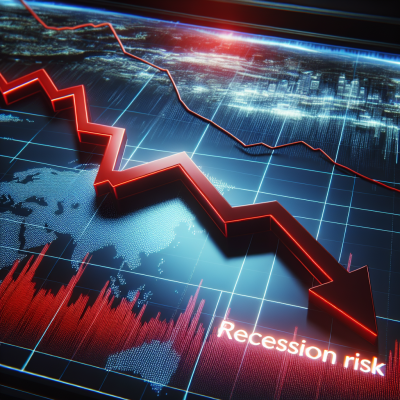
Stock Market Slides Amid Recession Fears as Trump Calls It a “Period of Transition”
The stock market took a significant hit recently, amplifying fears of an impending recession. Former President Donald Trump addressed the concerns but stopped short of dismissing the possibility of a downturn, characterizing the current economic situation as a “period of transition.”
As investors react to uncertainty in financial markets, let’s explore the factors contributing to the decline and what it could mean for the broader economy.
###
Market Impact: Stocks Take a Plunge
Recent trading sessions have been marked by turbulence, reflecting investor apprehension. Several key drivers have played a role in the market’s volatility, including:
- Economic Uncertainty: Questions surrounding inflation, interest rates, and consumer spending continue to shake investor confidence.
- Federal Reserve Policies: The Fed’s approach to tackling inflation through rate hikes has contributed to concerns about slowing economic growth.
- Political Rhetoric: Trump’s remarks—while avoiding direct predictions—did not alleviate fears about a potential recession.
Major indexes, including the Dow Jones Industrial Average, NASDAQ, and S&P 500, saw sharp declines as investors reacted to ongoing economic concerns.
###
Trump’s Take: “A Period of Transition”
When questioned about the possibility of a recession, Trump refrained from definitive statements, instead categorizing current economic conditions as a “period of transition.” This phrasing suggests uncertainty about whether the economy is heading toward a downturn or merely experiencing short-term fluctuations.
Trump’s response comes at a critical time when both Wall Street and Main Street are looking for clarity regarding the financial outlook. Experts caution that such vague characterizations do little to calm market anxieties.
###
What’s Driving the Fears?
Several factors contribute to growing fears of an economic slowdown:
####
1. Interest Rate Hikes
The Federal Reserve has been aggressively raising interest rates to combat inflation. While higher rates slow inflation, they also reduce consumer purchasing power and business investment, increasing recession risks.
####
2. Global Market Conditions
Stock market volatility isn’t exclusive to the U.S. Global economic conditions, including sluggish growth in major economies like China and ongoing geopolitical tensions, contribute to broader financial instability.
####
3. Consumer Sentiment
Rising prices and uncertainty about the job market impact consumer confidence. A reduction in consumer spending—one of the biggest drivers of the U.S. economy—could signal deeper economic problems.
###
What Does This Mean for Investors?
For investors, market downturns can be unsettling. However, financial experts often recommend the following strategies during periods of economic uncertainty:
- Diversify Your Portfolio: Spreading investments across multiple asset classes can help minimize risk.
- Stay the Course: While market volatility can be stressful, long-term investors should avoid making hasty decisions based on short-term fluctuations.
- Review Investment Strategies: With recession risks looming, consider defensive investments such as bonds, dividend stocks, and essential sectors like healthcare and consumer staples.
###
Where Is the Economy Headed?
While some experts predict a recession, others believe the economy might stabilize after a brief slowdown. Much depends on the Federal Reserve’s approach, global economic developments, and domestic fiscal policies.
For now, uncertainty remains, and the stock market’s reaction to these concerns underscores investor anxieties. Whether the economy slips into a recession or emerges from this “transition” period stronger remains to be seen.
###
Final Thoughts
The stock market’s recent slide highlights the fragility of investor confidence amid economic concerns. Donald Trump’s characterization of the situation as a “period of transition” has not provided much reassurance to financial markets.
As inflation, interest rates, and global economic dynamics continue to shape the landscape, investors and businesses will be closely watching for signs of stability—or further turbulence.
Will the economy withstand these pressures, or are we on the brink of a downturn? Only time will tell, but staying informed and prepared is key to navigating this uncertain period.


Leave a Reply